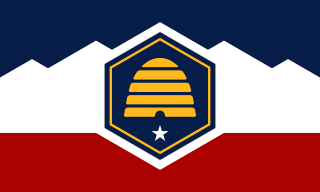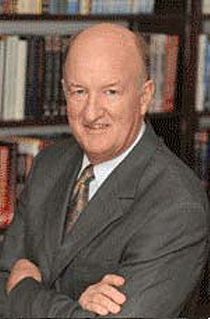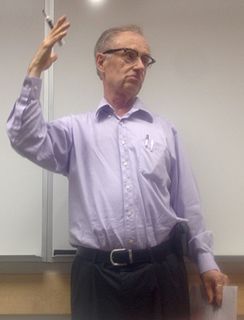Related Research Articles

Utah is a state in the Mountain West subregion of the Western United States. Utah is a landlocked U.S. state bordered to its east by Colorado, to its northeast by Wyoming, to its north by Idaho, to its south by Arizona, and to its west by Nevada. Utah also touches a corner of New Mexico in the southeast. Of the fifty U.S. states, Utah is the 13th-largest by area; with a population over three million, it is the 30th-most-populous and 11th-least-densely populated. Urban development is mostly concentrated in two areas: the Wasatch Front in the north-central part of the state, which is home to roughly two-thirds of the population and includes the capital city, Salt Lake City; and Washington County in the southwest, with more than 180,000 residents. Most of the western half of Utah lies in the Great Basin.

Jeffrey Roy Holland is an American educator and religious leader. He served as the ninth President of Brigham Young University (BYU) and is a member of the Quorum of the Twelve Apostles of The Church of Jesus Christ of Latter-day Saints. As a member of the Quorum of the Twelve, Holland is accepted by the church as a prophet, seer, and revelator. Currently, he is the fourth most senior apostle in the church.

Joseph Bracken Lee was an American political figure in the state of Utah. A Republican, he served two terms as the 9th Governor of Utah (1949–1957), six 2-year terms as mayor of Price, Utah (1935–1947), and three terms as the 27th mayor of Salt Lake City (1960–1971).

Willard Cleon Skousen was an American conservative author and faith-based political theorist. A notable anti-communist and supporter of the John Birch Society, Skousen's works involved a wide range of subjects including the Six-Day War, Mormon eschatology, New World Order conspiracies, and parenting. His most popular works are The Five Thousand Year Leap and The Naked Communist.

Mark Andrew Skousen is an American economist and writer. He currently teaches at Chapman University, where he is a Presidential Fellow at The George L. Argyros School of Business and Economics. He has previously taught at Columbia Business School, Mercy College, Barnard College, and Rollins College.

Royal Jon Skousen is a retired professor of linguistics and English at Brigham Young University (BYU), where he is editor of the Book of Mormon Critical Text Project. He is "the leading expert on the textual history of the Book of Mormon" and the founder of the analogical modeling approach to language modeling.
Joel M. Skousen is a political commentator on the philosophy of law and Constitutional theory.

George Wythe University (GWU) was an unaccredited, non-profit university in Salt Lake City, Utah. GWU's curriculum borrowed from the Great Books of the Western World published in 1952 by Britannica and it claimed that its methodology was based on the Socratic seminar and Oxford tutorial system. The school was named in honor of George Wythe, mentor to Thomas Jefferson. The college closed in August 2016.
Dr. Donald N. Sills was a Baptist minister and one of the founders of George Wythe College, and previous chairman of the George Wythe Foundation Board of Trustees. He served as the first president of George Wythe College, and was succeeded by Oliver DeMille.
Coral Ridge Baptist University (CRBU) was a Bible college and seminary in Florida. It merged with Freedom University and Seminary in 2001.
Bookcraft was a major publisher of books and products for members of The Church of Jesus Christ of Latter-day Saints.
The Association for Mormon Letters (AML) is a nonprofit organization founded in 1976 to "foster scholarly and creative work in Mormon letters and to promote fellowship among scholars and writers of Mormon literature." Other stated purposes have included promoting the "production and study of Mormon literature" and the encouragement of quality writing "by, for, and about Mormons." The broadness of this definition of LDS literature has led the AML to focus on a wide variety of work that has sometimes been neglected in the Mormon community. It publishes criticism on such writing, hosts an annual conference, and offers awards to works of fiction, poetry, essay, criticism, drama, film, and other genres. It published the literary journal Irreantum from 1999 to 2013 and currently publishes an online-only version of the journal, which began in 2018. The AML's blog, Dawning of a Brighter Day, launched in 2009. As of 2012, the association also promotes LDS literature through the use of social media. The AML has been described as an "influential proponent of Mormon literary fiction."
The Meadeau View Institute was a conservative organization that operated in Duck Creek, Utah, from the mid-1980s to the early 1990s. The institute was notable for seeking to build a Utopian community of alternative-lifestyle conservatives in Southern Utah. The community collapsed in 1994 due to financial problems incident to the loss of property in an accidental explosion.
William H. Doughty started a conservative lifestyle community, the Meadeau View Institute, and Liberty Village in Southern Utah from 1986 to the early 1990s. He was also founder of the Institute for Constitutional Education (ICE) and a founder of George Wythe College. He was a close friend of W. Cleon Skousen. He is also mentor to Shanon Brooks and Oliver DeMille, past presidents of George Wythe.

Glenn Kimber is an American author and educator. He founded Kimber Academy, a network of private schools, and is a prominent figure among U.S. homeschooling families.
Mammoth Valley is a depression in Southern Utah between Hatch and Duck Creek. The Mammoth Creek flows along its floor.
The National Center for Constitutional Studies (NCCS) is a conservative, religious-themed organization, founded by Latter-day Saint political writer W. Cleon Skousen. It was formerly known as The Freemen Institute.

The Church of Jesus Christ of Latter-day Saints in Utah refers to The Church of Jesus Christ of Latter-day Saints and its members in Utah. Utah has more church members than any other U.S. state or country. The LDS Church is also the largest denomination in Utah.
Paul Skousen is a son of W. Cleon Skousen, and is a writer of popular books including The Naked Socialist. He has written other books aimed at the Latter Day Saint market.
This is a timeline of LGBT Mormon history in the 1950s, part of a series of timelines consisting of events, publications, and speeches about LGBTQ+ individuals, topics around sexual orientation and gender minorities, and the community of members of The Church of Jesus Christ of Latter-day Saints. Although the historical record is often scarce, evidence points to queer individuals having existed in the Mormon community since its beginnings. However, top LDS leaders only started regularly addressing queer topics in public in the late 1950s. Since 1970, the LDS Church has had at least one official publication or speech from a high-ranking leader referencing LGBT topics every year, and a greater number of LGBT Mormon and former Mormon individuals have received media coverage.
References
- ↑ Parkinson, Paul; Cates, Karl (1994-07-26). "Backers Tried in Vain to Recover Losses". Deseret News . Archived from the original on 2009-07-28. Retrieved 2009-04-22.
- ↑ "Perspectives on Doughty Story". Colleen Gleason. Deseret News. A11. 29 July 1994.
- ↑ "The First Fifteen Years" (PDF). Retrieved 2009-01-20.[ dead link ]
- ↑ Brooks, Shanon. "The First Fifteen Years" (PDF). p. 1. Retrieved 2009-04-21.[ dead link ]
- ↑ "Youth for America". Archived from the original on January 16, 2009. Retrieved January 20, 2009.
- ↑ "Ex-Devotees Want to Know: Where Did the Money Go?" Paul Parkinson and Karl Cates, Deseret News, A1, 25 July 1994.
- ↑ "Youth For America to hold conferences in Cedar City this summer!". newsletter.gw.edu. May 2008. Archived from the original on 2010-05-30. Retrieved 2009-12-22. see very bottom of newsletter.
- ↑ Rogers, Kelly (July 2004). "A Juror's Experience" (PDF). The Statesman. 8 (7): 6. Archived (PDF) from the original on 2016-03-03. Retrieved 2008-12-25.
- ↑ Paul, Hayley (July 2008). "Youth for America 2008 a Success!". newsletter.gw.edu. Archived from the original on 2008-09-28. Retrieved 2009-12-21.
- ↑ "About YFF". Archived from the original on June 22, 2012. Retrieved January 23, 2012.